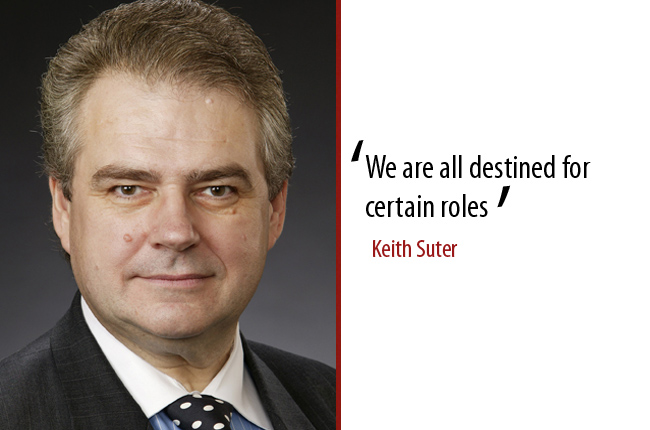Consumer control and transparency for advisors of the future
Ian Knox… ‘I wanted to input my own sense of values’
Ian Knox surprised his friends and colleagues when he decided to launch his own business in 2004. He had had a series of senior roles at large financial services companies – Lend Lease, Westpac and St George – before linking up with Charlie Haynes to form Paragem which was formally launched in 2005. The Paragem business became the largest supplier of dealer backoffice services to over 200 AFSL holders before it decided to launch its own licence to look after high quality independent advisors. The company is now one of the largest independent advice AFSLs in the industry, overseeing about $2 billion in funds under advice. He speaks to Greg Bright
When he started Paragem, Ian Knox says, institution-owned financial planning practices accounted for about 75 per cent of the advice industry. Today it’s 90 per cent. And despite the best intentions of the Government, FOFA is actually making the situation worse.
Knox has worked with advisors for most of his career, starting out with Greg Paramor’s Growth Equities Mutual in the 1980s, after moving from the UK to Australia. He was recruited to the former Lend Lease Investment Services (MLC), as general manager before becoming CEO, then to Westpac Investment Management as deputy managing director and finally to head up Sealcorp which included Asgard, Securitor and Assirt research for St George Bank.
“I had done well financially and wanted to do something where I could control my own destiny and input my own sense of values,” he says. “I felt I could bring my corporate experience to the table and help advisors to get scale and outmaneuver large business. I have always loved small business because its truly where the risks are carried and people are real.”
He had started thinking about going out on his own after witnessing first hand, with a group of other Australian financial services people, including his then Sealcorp colleague Dan Powell, the 9/11 attack on the World Trade Centre. After seeing people actually die, it crystallised in his mind that it was important to pursue personal goals and gain experience more than corporate life.
“There were a lot of planners I knew who were disgruntled with their current arrangements and where the industry was heading,” Knox says. “I wanted to separate out asset management, advice and administration. I wanted to create financial value on the advice part as it was the lower part of the value chain in dollar terms.”
With Haynes a former MD as well, from a technology background, Paragem acquired two businesses: the ‘D-Bos’ planner support business from Zurich followed by a compliance business from Tribeca which was also acquired by USA Kaplan. About 28 staff managed those businesses plus the original core business of providing an independent licence for planners. Paragem set up shop in June 2005 in the heart of Sydney and according to Knox the largest challenge was creating a brand that stood for something. He feels Paragem achieved a brand status for ethical standards, good governance and compliance and a driver of transparency in the industry. Knox’s own drive is thought leadership.
The GFC and looming regulatory changes presented challenges. Paragem was growing, but not fast enough for the owners’ liking. And running a compliance business wasn’t the primary goal when they formed. Paragem sold the dealer services arm, which represented the rump of the day-to-day operations, to NetWealth in 2011, to concentrate on providing an AFSL for established high end planners seeking true independence and who had typically outgrown the so called aligned models.
Knox made a big deal of independence when he left St George to start Paragem. He says some people accused him of too much bank bashing.
“It’s not true but there is a lack of leadership in making advice pre-eminent in the banks and, highlighting their management conflicts often creates a bank bashing image,” he says. “The banks perform an important and necessary part of the financial advice industry for a lot of people. But the fact is they value advice for product sale outcomes not customer experiences. They even measure their wealth divisions based on $ and FUM. Quite naturally they have a vertical integration model which is anathema to independent advice for consumers… I’m not anti-bank but currently the independent providers are seriously disadvantaged and I do strive for a level playing field.”
Paragem currently provides licensing and support for 17 practices and 41 advisors, with over $2 billion under advice and generating $20 million in revenue. He feels this would double if the government enabled freedom for advisors to move licences without financial penalties.
While he was at Sealcorp, and prior to the 9/11 tragedy, which prompted him to rethink his career, Knox says he was becoming increasingly concerned about bundling and commissions. When FOFA was first announced, he says, it tended to validate his philosophical views and Paragem found itself in the enviable position of running a post FOFA business in a pre-FOFA world so the changes have been minimal.
The final iteration of FOFA is disappointing, mainly because of the grand-fathering that was promised during the “watering down process” when the banks hit back at a hapless Government which was probably more concerned with its own survival than good legislation.
“FOFA tries to identify and eliminate conflicts due to remuneration practices but as the legislation is drawn up it actually promotes vertical integration and cross-subsidisation,” Knox says. “The grand-fathering clause also has bizarre consequences. For instance, if an advisor moves from one licence to another, and is receiving income which is previously deemed ‘conflicted’ the new licencee can received that income but cannot pass it on to the advisor… The whole industry is now in a deep freeze and old models ironically retain the status quo.” We will also look at some form vertical integration if we are to remain competitive but most likely around the portfolio reporting areas.
Paragem has made representations to both the old and new governments about what it considers an unfortunate consequence of the FOFA legislation’s drafting. After all, FOFA was all about independence of advice, which is what Paragem is all about. Industry talk is that the bank-owned dealer groups are compensating the planners to move to their networks by using their own balance sheets and paying out large lump sums to compensate for any lost revenue.
Knox brought in rebates for planners and consumers when he when he was at Sealcorp. He even tried to stop fund managers from sponsoring lavish Sealcorp conferences, to the chagrin of journalists, among others.
Knox believes that if the Government doesn’t act soon, it will encourage soft-dollar deals between dealer groups, advisors and managers.
“I know how to get around it,” he says, “but I’m not going to do that. I want to meet the spirit and the intent of the law… FOFA came in because of the lack of transparency in the industry. Ironically all the institutions are grappling with it because it creates margin compression when the truth comes out on where money is made”
Paragem will only deal with practices with a completely clean history of complaints and with a significant level of funds under advice. It provides a consistent investment philosophy and framework which the practices can adapt to their own client needs.
Knox believes that it is increasingly “antiquated and expensive” to deal with a traditional wrap, which still dominate the advice industry, although to a decreasing amount given the continued rise of SMSFs.
Many feel “Unit trusts let people down through the GFC, as have some active fund managers,” he says. “That’s one of the reasons for the growth in SMSFs. At Paragem we are active promoters and supporters of managed accounts… the key to the future is more consumer control and greater transparency and I think advisors will flourish in that environment if they use managed accounts selectively. It enables independently managed accounts to be created alongside professional investment management support … overall we feel this is a boutique advisor proposition not a mass market solution”.
Paragem’s investment philosophy concentrates on asset allocation as the prime driver of returns and it looks to assist advisors in portfolio construction with education and training. It also is a believer in behavioral finance and acknowledges active management will always be called upon. From Knox’s perspective while he doesn’t provide advice he feels if anything he has bias towards value investing.
“Despite managed accounts, I also see an ongoing need for unit trusts in asset classes such as emerging markets, small caps and international equities and bonds, for active or indexed mandates. ETF’s increasingly play a part as well.”









